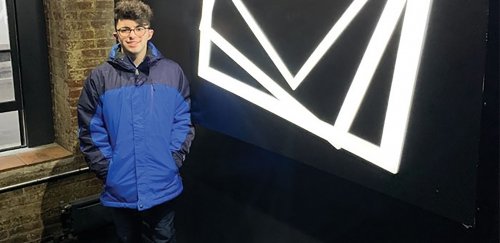"The Disability Service Center Has Provided So Much": One Student’s Experience Navigating Disabilities on Campus
- News & Events
- News
- "The Disability Service Center Has Provided So Much": One Student’s Experience Navigating Disabilities on Campus

Alexander Kalajian praises the Disability Services Center, especially Director Keri Rossi-D'entremont: "They are always there when I need them," he says.
This has been a year of challenges, not the least of which has been the transition to remote learning at Rhode Island College. The school's Accessibility Committee has worked hard to ensure that the entire campus community has the proper accommodations to continue learning in this online environment, particularly students registered with the Disability Services Center (DSC).
That is the case for Alexander Kalajian, an art major with concentrations in painting and photography. He lives with vision and hearing impairments, as well as a learning processing disorder and relies on accommodations provided by the DSC.
Before COVID, teachers would wear a special microphone connected to Alexander's hearing aid. "If the teacher was moving around, I wouldn't miss any information, or if the teacher was in the back of the room, I would still be able to hear what they were saying," he explains. This is important because people with hearing impairments often rely on reading a speaker's lips for a better understanding; in many cases, that wouldn't have been possible for Alexander without the device.
Similarly, to help his visual impairment, he was able to sit in the front row of the classroom and get class materials and books enlarged either on paper or an iPad.
For Alexander's learning processing disorder, which causes him to take a bit longer to process information, the DSC provides him with a separate room to take tests and quizzes, and also extra time to finish assignments. "I would get to do it in a separate area by myself, so I don't feel rushed," he says. "Plus, sometimes I read the question to myself out loud, and I don't want to distract the other kids who are taking the test, so I get my own quiet area." He strongly believes that accommodations are a necessity to help him succeed.
Before the pandemic, Alexander used to live on campus. "But once COVID happened I decided to live at home because I feel that it is safer, and also I just didn't want to risk anything," he says. "I've learned to adapt to it. At first I was a little angry because of even the little things, like you can't go to this building or do this. Last year, I was going to concerts and that was sort of a big thing for me. I asked, 'When would it end?'"
For him it was much easier being on campus and having everything at his fingertips, whereas now if he needs to meet someone at school, he needs to set a time in advance and get a ride there. "The biggest thing for me is being independent, on my own," he explains. "At first, when I was a freshman, I was a little bit nervous, but then over time I really adapted to the living situation and I was able to do things on my own time."
Alexander was already immersed in college life. As part of his daily routine, he would run between classes and was involved in extracurricular activities, the equestrian team being the one he enjoyed most. "I miss the equestrian team because for the majority of my life that is what I was doing, riding horses," he says. "And I miss that feeling of being with other people."
Now that Alexander's been dealing with all the restrictions of the pandemic for more than seven months, he's been able to adjust. One of the keys has been learning to say, "You know what? I might not be able to do this but let's look on the bright side," he says. "Let's look at the positive and at what I appreciate and see every day, like my parents and my family. Some people don't have that, so I look on the bright side and feel lucky with what I do have. I kind of flipped it around in a sense."
Alexander has also learned to manage time better, set a routine to do school work, and take advantage of the technologies available for online classes. "This semester is a lot better than last semester because people now are more aware of Zoom and other online alternatives. It's making it easier from a learning perspective and for my education," he says. "Zoom was helpful because it helped me set up a timeline for myself and work on the management issues that I had."
Up until Thanksgiving, his course load mixed both online and in-person. "My photography class is 85 percent online; the rest in the classroom, in case we have to do any kind of developing or in-class demonstration. My painting studio is fully in-person," he explains. "The one class that is fully online, my linguistics class, is amazing. Professor Elijah Edelman is very accommodating, not only to people with disabilities, but to everyone. He wants you to learn the way you want to learn and he is very adaptive and understanding."
Alexander praises the DSC, especially Director Keri Rossi-D'entremont."They are always there when I need them," he says. "They are always there to help me out. I can always count on them."
Now that he has learned how to succeed in college life, Alexander is using his experience to help educate and support others, including visiting high schools to talk to students about how he got to college. "I am always willing to explain my disability and some of the challenges that I've had and how they are not holding me back," he says. "I want to let other people know that you can still achieve and do great things even though you might have to work more. It's worth it!"
